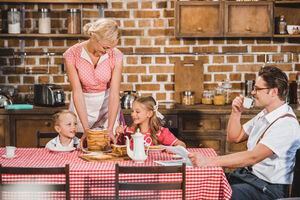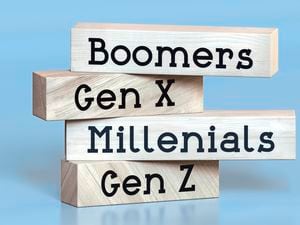Harking back to happier times
Horace Camp thought everything was just fine during his care-free childhood in the 1950s, so why is everyone so miserable now?

My original plan was to write today about the safety of women on our streets and in our homes and workplaces. It is a big topic and one we need to keep on the agenda for as long as we can and hopefully long enough for beneficial cultural changes to be made.
Two things convinced me not to embrace this topic. The first was the excellent two-pager written by Helen Hubert in the Tuesday edition of this paper which was hard hitting and comprehensive enough to get the message across.
The second was the looks of horror given to me by my daughters when I casually informed them of my chosen topic. In no uncertain terms they pressed upon me that, though my intentions are good and my opinions on the issue are quite right, my 1950s view of the world would, when expressed in words, result in at best being labelled a misogynist and at worst being tarred and feathered by militant feminists.
Discretion being the better part of valour, I took their advice and instead today you will be reading my Plan B column, which I am dreadfully sorry to report will be about why the 21st century is such a miserable place.
Cultural changes creep up on us so slowly that we can hardly tell that changes are taking place. It is only when we stop and compare life now to life 50 or 60 years ago that we realise what an enormous change has taken place. And all in a lifetime.
I was fortunate enough to stumble upon an amazing archive of British B films made in the 1950s and for the past few weeks thanks to YouTube I have been spending a lot of time in the black and white world of my childhood but watching the films aimed at my parents’ generation.
I felt very comfortable watching them and indeed felt remarkably good about things after a good binge watching session of some remarkably good productions. In the main well written and certainly well acted. I may not have recognised all the stars, but many of the supporting actors and dare I say actresses were destined for greater things and I enjoyed spotting them in their bit roles.
The films are representative of their age. Everyone smoked too much. Social class divisions were quite obvious and men and women lived very different lives. Everyone was white and ‘foreigners’ were fantastic stereotypical parodies of their national characteristics.
The polio, tuberculosis and other killer diseases were only touched upon when the plot called for it, of course. And it goes without saying that working men were always quoting union rules and standing up to their aristocratic bosses who we could clearly see were only doing their best in the men’s interest and really employer and employee deep down knew they were a team.
And here now is the big difference between now and then. All of those films was designed to raise the spirits of the audience. They entertained and gave everyone a place where for an hour or two each week they could leave their worries behind and just enjoy the moment.
Nine times out of 10 no matter how traumatic and dark the events portrayed may have been – and yes one did revolve around the murder of a woman in the park – the film would continue until it reached an uplifting ending to ensure that punters left the cinema feeling great and that ultimately there is always hope, always a new beginning.
Watching YouTube is not quite the same as sitting in the Odeon but it does enable folk to comment as they watch. The most striking comments are from the youngsters (probably under 50) who never knew the period and are shocked by the differences in the way of life.
Men are allowed to take children fishing without police checks. Risk assessments aren’t made, no seat belts are worn and primary school children are allowed to play unsupervised around bomb sites. I realise that the films represent a fantasy, fictional world, but one clearly based on the reality of the time.
Some are dramas and some are comedies, but they all play on a general understanding that bad things can and do happen but generally things work out for the best and that most people are good and honest.
Gosh, how that message has changed today. Entertainment these days is rarely a feel good escape from reality and the general consensus view appears to be things have always been bad, they are worse now than yesterday and they will be much worse tomorrow.
The general public is inherently bad and should never be trusted. There is no hope for tomorrow because all the corrupt politicians and giant corporates are grabbing everything for themselves, leaving little or nothing for us, the masses.
There never was a good time and nostalgia is not only not what it was but is pure BS made up by imperial colonialists to fool the gullible people and keep us down.
No, the only reality is now, where everyone not in your immediate circle is ‘phobic’, bigoted and is in no way to be trusted. I couldn’t believe reading on Twitter that some folk seek police checks on new partners to ensure they will be safe in their new relationships.
The 21st century plague is not Covid but the ‘fear of fear’. Our new society cannot get enough of frightening us and reminding us just how unsafe a world we live in. By attempting to remove danger, have we only managed to replace it with fear of danger?
I’m so grateful to have had a 1950s childhood where everything seemed just fine. All right, school was a nuisance, but everything else was great. I didn’t worry about nukes, or climate change, nor was I brought too early into the adult world of relationships way before my time.
Have we now wrapped our children and our grandchildren in so much cotton wool they are afraid of everything? No wonder they are so stressed about relatively trivial dangers. Can we do something about it before it is too late?





